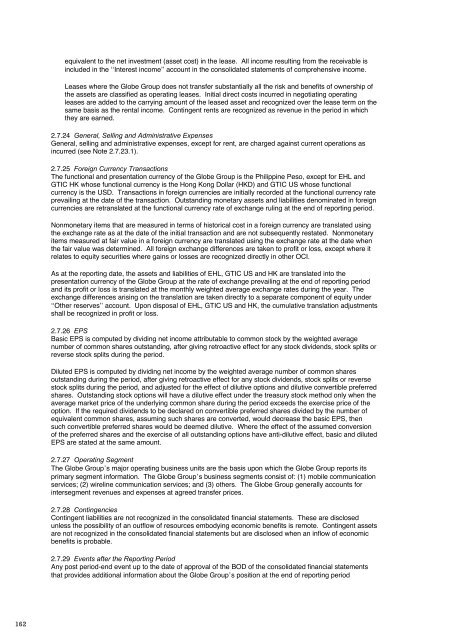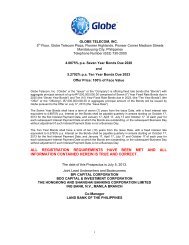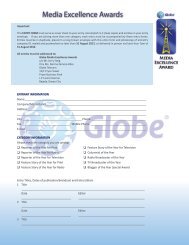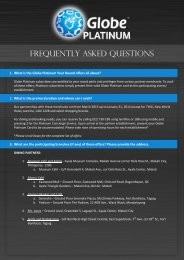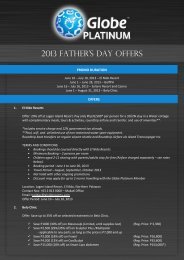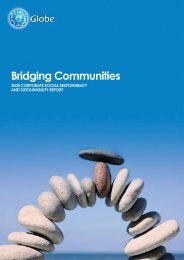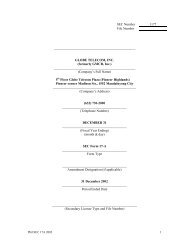here - Ayala
here - Ayala
here - Ayala
You also want an ePaper? Increase the reach of your titles
YUMPU automatically turns print PDFs into web optimized ePapers that Google loves.
Globe 2012 annual report<br />
financial report<br />
equivalent to the net investment (asset cost) in the lease. All income resulting from the receivable is<br />
included in the “Interest income” account in the consolidated statements of comprehensive income.<br />
Leases w<strong>here</strong> the Globe Group does not transfer substantially all the risk and benefits of ownership of<br />
the assets are classified as operating leases. Initial direct costs incurred in negotiating operating<br />
leases are added to the carrying amount of the leased asset and recognized over the lease term on the<br />
same basis as the rental income. Contingent rents are recognized as revenue in the period in which<br />
they are earned.<br />
2.7.24 General, Selling and Administrative Expenses<br />
General, selling and administrative expenses, except for rent, are charged against current operations as<br />
incurred (see Note 2.7.23.1).<br />
2.7.25 Foreign Currency Transactions<br />
The functional and presentation currency of the Globe Group is the Philippine Peso, except for EHL and<br />
GTIC HK whose functional currency is the Hong Kong Dollar (HKD) and GTIC US whose functional<br />
currency is the USD. Transactions in foreign currencies are initially recorded at the functional currency rate<br />
prevailing at the date of the transaction. Outstanding monetary assets and liabilities denominated in foreign<br />
currencies are retranslated at the functional currency rate of exchange ruling at the end of reporting period.<br />
Nonmonetary items that are measured in terms of historical cost in a foreign currency are translated using<br />
the exchange rate as at the date of the initial transaction and are not subsequently restated. Nonmonetary<br />
items measured at fair value in a foreign currency are translated using the exchange rate at the date when<br />
the fair value was determined. All foreign exchange differences are taken to profit or loss, except w<strong>here</strong> it<br />
relates to equity securities w<strong>here</strong> gains or losses are recognized directly in other OCI.<br />
As at the reporting date, the assets and liabilities of EHL, GTIC US and HK are translated into the<br />
presentation currency of the Globe Group at the rate of exchange prevailing at the end of reporting period<br />
and its profit or loss is translated at the monthly weighted average exchange rates during the year. The<br />
exchange differences arising on the translation are taken directly to a separate component of equity under<br />
“Other reserves” account. Upon disposal of EHL, GTIC US and HK, the cumulative translation adjustments<br />
shall be recognized in profit or loss.<br />
2.7.26 EPS<br />
Basic EPS is computed by dividing net income attributable to common stock by the weighted average<br />
number of common shares outstanding, after giving retroactive effect for any stock dividends, stock splits or<br />
reverse stock splits during the period.<br />
Diluted EPS is computed by dividing net income by the weighted average number of common shares<br />
outstanding during the period, after giving retroactive effect for any stock dividends, stock splits or reverse<br />
stock splits during the period, and adjusted for the effect of dilutive options and dilutive convertible preferred<br />
shares. Outstanding stock options will have a dilutive effect under the treasury stock method only when the<br />
average market price of the underlying common share during the period exceeds the exercise price of the<br />
option. If the required dividends to be declared on convertible preferred shares divided by the number of<br />
equivalent common shares, assuming such shares are converted, would decrease the basic EPS, then<br />
such convertible preferred shares would be deemed dilutive. W<strong>here</strong> the effect of the assumed conversion<br />
of the preferred shares and the exercise of all outstanding options have anti-dilutive effect, basic and diluted<br />
EPS are stated at the same amount.<br />
2.7.27 Operating Segment<br />
The Globe Group’s major operating business units are the basis upon which the Globe Group reports its<br />
primary segment information. The Globe Group’s business segments consist of: (1) mobile communication<br />
services; (2) wireline communication services; and (3) others. The Globe Group generally accounts for<br />
intersegment revenues and expenses at agreed transfer prices.<br />
2.7.28 Contingencies<br />
Contingent liabilities are not recognized in the consolidated financial statements. These are disclosed<br />
unless the possibility of an outflow of resources embodying economic benefits is remote. Contingent assets<br />
are not recognized in the consolidated financial statements but are disclosed when an inflow of economic<br />
benefits is probable.<br />
2.7.29 Events after the Reporting Period<br />
Any post period-end event up to the date of approval of the BOD of the consolidated financial statements<br />
that provides additional information about the Globe Group’s position at the end of reporting period<br />
(adjusting event) is reflected in the consolidated financial statements. Any post period-end event that is not<br />
an adjusting event is disclosed in the consolidated financial statements when material.<br />
3. Management’s Significant Accounting Judgments and Use of Estimates<br />
The preparation of the accompanying consolidated financial statements in conformity with PFRS requires<br />
management to make estimates and assumptions that affect the amounts reported in the consolidated financial<br />
statements and accompanying notes. The estimates and assumptions used in the accompanying consolidated<br />
financial statements are based upon management’s evaluation of relevant facts and circumstances as of the<br />
date of the consolidated financial statements. Actual results could differ from such estimates.<br />
Judgments and estimates are continually evaluated and are based on historical experience and other factors,<br />
including expectations of future events that are believed to be reasonable under the circumstances.<br />
3.1 Judgments<br />
3.1.1 Leases<br />
3.1.1.1 Operating lease commitments as lessor<br />
The Group has entered into a lease agreements as a lessor. Critical judgment was exercised by<br />
management to distinguish the lease agreement as either an operating or finance lease by looking at<br />
the transfer or retention of significant risk and rewards of ownership of the properties covered by the<br />
agreements. The Group has determined that it retains all the significant risks and rewards of<br />
ownership of the properties and so accounts for the agreement as an operating lease<br />
(see Note 25.1.1).<br />
3.1.1.2 Operating lease commitments as lessee<br />
The Group has entered into various lease agreements as a lessee w<strong>here</strong> it has determined that the<br />
lessors retain all the significant risks and rewards of ownership of the properties and, as such,<br />
accounts for the agreements as operating lease (see Note 25.1.1).<br />
3.1.1.3 Finance lease<br />
The Globe Group has entered into a finance lease agreement related to hardware infrastructure and<br />
information equipment. They have determined, based on the evaluation of the terms and conditions of<br />
the arrangement, that they bear substantially all the risks and rewards incidental to ownership of the<br />
said machineries and equipment and so account for the contracts as finance leases (see note 25.1.2).<br />
3.1.2 Fair value of financial instruments<br />
When the fair value of financial assets and financial liabilities recorded in the consolidated statement of<br />
financial position cannot be derived from active markets, their fair value is determined using valuation<br />
techniques including the discounted cash flow model. The inputs to these models are taken from<br />
observable markets w<strong>here</strong> possible, but w<strong>here</strong> this is not feasible, a degree of judgment is required in<br />
establishing fair values. The judgments include considerations of inputs such as liquidity risk, credit risk<br />
and volatility. Changes in assumptions about these factors could affect the reported fair value of financial<br />
instruments.<br />
3.1.3 Financial assets not quoted in an active market<br />
The Globe Group classifies financial assets by evaluating, among others, whether the asset is quoted or not<br />
in an active market. Included in the evaluation on whether a financial asset is quoted in an active market is<br />
the determination on whether quoted prices are readily and regularly available, and whether those prices<br />
represent actual and regularly occurring market transactions on an arm’s-length basis.<br />
3.1.4 Allocation of goodwill to cash-generating units<br />
The Globe Group allocated the carrying amount of goodwill to the mobile content and application<br />
development services business CGU, for the Group believes that this CGU represents the lowest level<br />
within the Globe Group at which the goodwill is monitored for internal management reporting purposes; and<br />
not larger than an operating segment determined in accordance with PFRS 8.<br />
3.1.5 Determination of whether the Globe Group is acting as a principal or an agent<br />
The Globe Group assesses its revenue arrangements against the following criteria to determine whether it<br />
is acting as a principal or an agent:<br />
whether the Globe Group has primary responsibility for providing the goods and services;<br />
162 163


